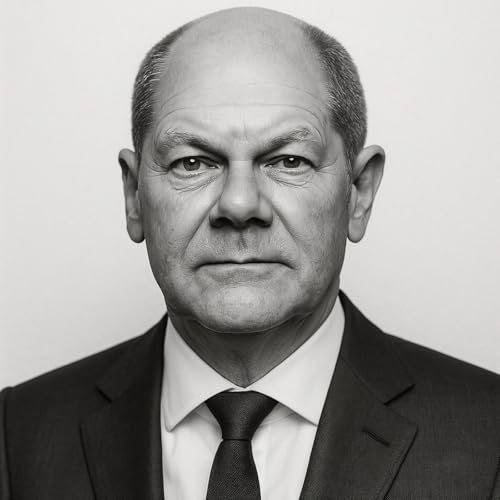
Olaf Scholz: Putin Call & Fiscal Legacy | Biography Flash
Failed to add items
Sorry, we are unable to add the item because your shopping cart is already at capacity.
Add to basket failed.
Please try again later
Add to Wish List failed.
Please try again later
Remove from Wish List failed.
Please try again later
Follow podcast failed
Unfollow podcast failed
-
Narrated by:
-
By:
About this listen
Olaf Scholz, former German Chancellor, has made headlines over the past week primarily for his unexpected outreach and shifting political legacy as Germany navigates turbulent times. Perhaps the most biographically significant development: Scholz broke diplomatic ice by calling Vladimir Putin on November 15, the first such direct contact between a major Western leader and Putin in two years. According to Responsible Statecraft, Scholz’s message was uncompromising—he condemned Russia’s war in Ukraine, demanded troop withdrawal, and insisted Germany would continue supporting Ukraine for as long as necessary. Scholz emphasized to reporters that “little has changed in the Russian President's views of the war,” calling the outcome not good news and revealing the call was made in close consultation with European partners, despite warnings from Ukrainian President Zelensky and others that this contact risked softening Russia’s isolation strategy. Kremlin spokesman Dmitry Peskov dubbed the conversation “frank,” but again, there was no convergence of views. While Scholz has now exited the Chancellery, this move will certainly mark a controversial and bold coda in his foreign policy approach.
On the domestic front, Scholz’s fiscal policies and their legacy are still reverberating. As reported by both AFP and Global Banking and Finance Review, the German parliament just passed a landmark 2025 budget following coalition chaos triggered by Scholz’s government collapse last year. The new budget, inspired in part by economic roadmaps laid out under Scholz, unleashes record public investment and defense spending, including a 500-billion-euro infrastructure fund and 100 billion for defense. This defies Germany’s once-symbolic fiscal restraint, with Finance Minister Lars Klingbeil calling it a “huge paradigm shift”—a description rooted in the Zeitenwende era Scholz branded after Russia’s invasion of Ukraine. Although Scholz’s critics decry the shift towards high borrowing and fear budget gaps, his hands-on legacy is baked into almost every page of this new economic agenda.
Meanwhile, Scholz remains a lightning rod in the fractious German debate over Russia policy. As detailed by News.bg, a German oppositionist, Ralph Niemeyer, referenced Scholz by name in his controversial appeal for Russian citizenship, recounting pressure placed on domestic dissenters—especially those who, like Niemeyer, vocally called for the opening of Nord Stream 2 during Scholz’s tenure.
On social media, Scholz’s decisive phone call with Putin and his fiscal legacy have inspired sharp debate, praise from those advocating dialogue, and criticism from Ukrainian supporters and Germany’s fiscal hawks alike. No substantial public appearance or business activity by Scholz himself has been recorded in the last 24 hours, as Germany’s new leadership under Chancellor Friedrich Merz takes center stage. But the continued focus on the policies Scholz set in motion—especially defense investment and the politics of talking to Russia—keep him firmly in the biographical spotlight.
That wraps up this week’s Olaf Scholz Biography Flash. Thank you for listening—subscribe so you never miss an update on Olaf Scholz and don’t forget to search for Biography Flash for more great biographies.
Get the best deals https://amzn.to/4mMClBv
This content was created in partnership and with the help of Artificial Intelligence AI
No reviews yet
In the spirit of reconciliation, Audible acknowledges the Traditional Custodians of country throughout Australia and their connections to land, sea and community. We pay our respect to their elders past and present and extend that respect to all Aboriginal and Torres Strait Islander peoples today.



